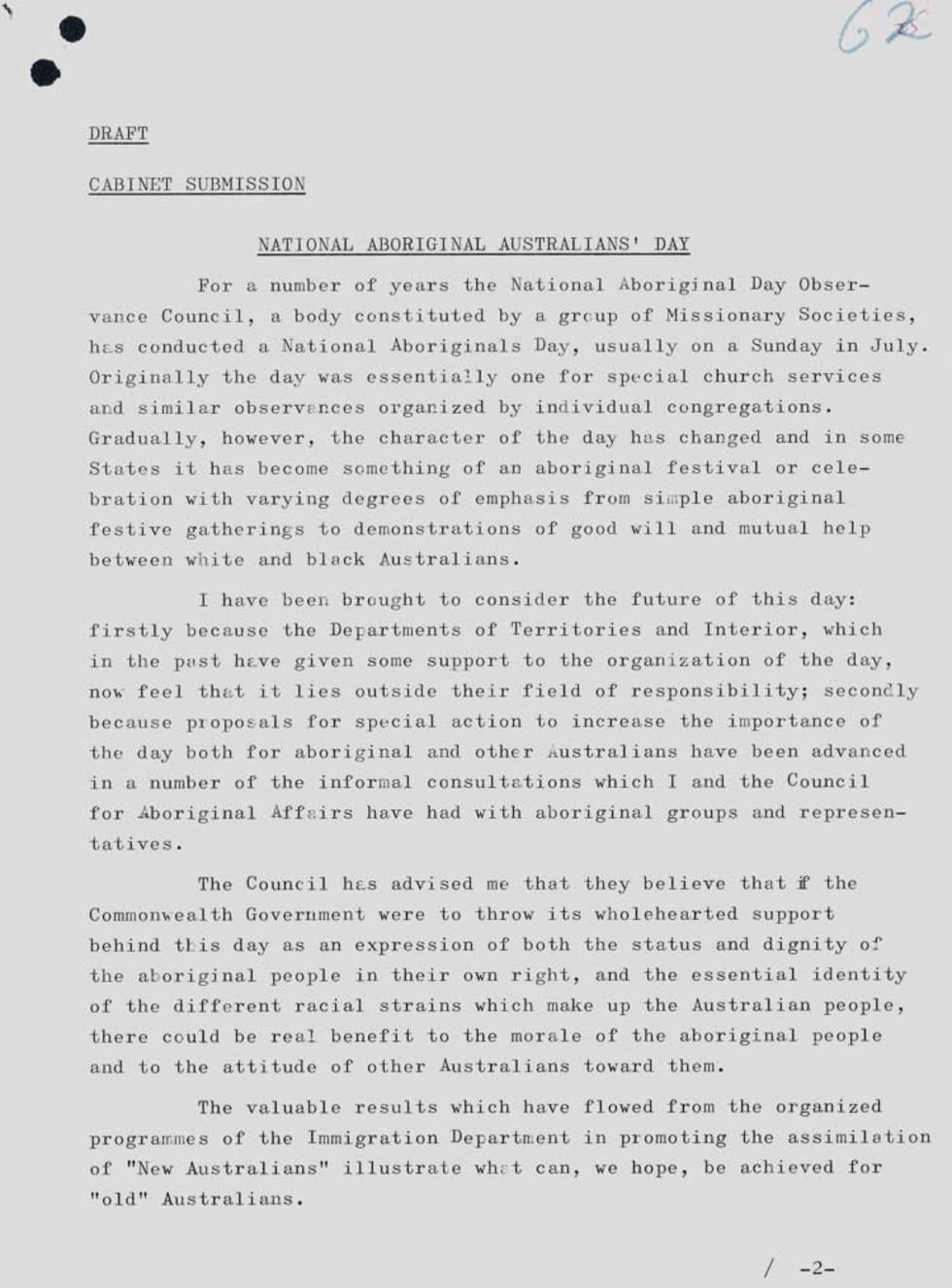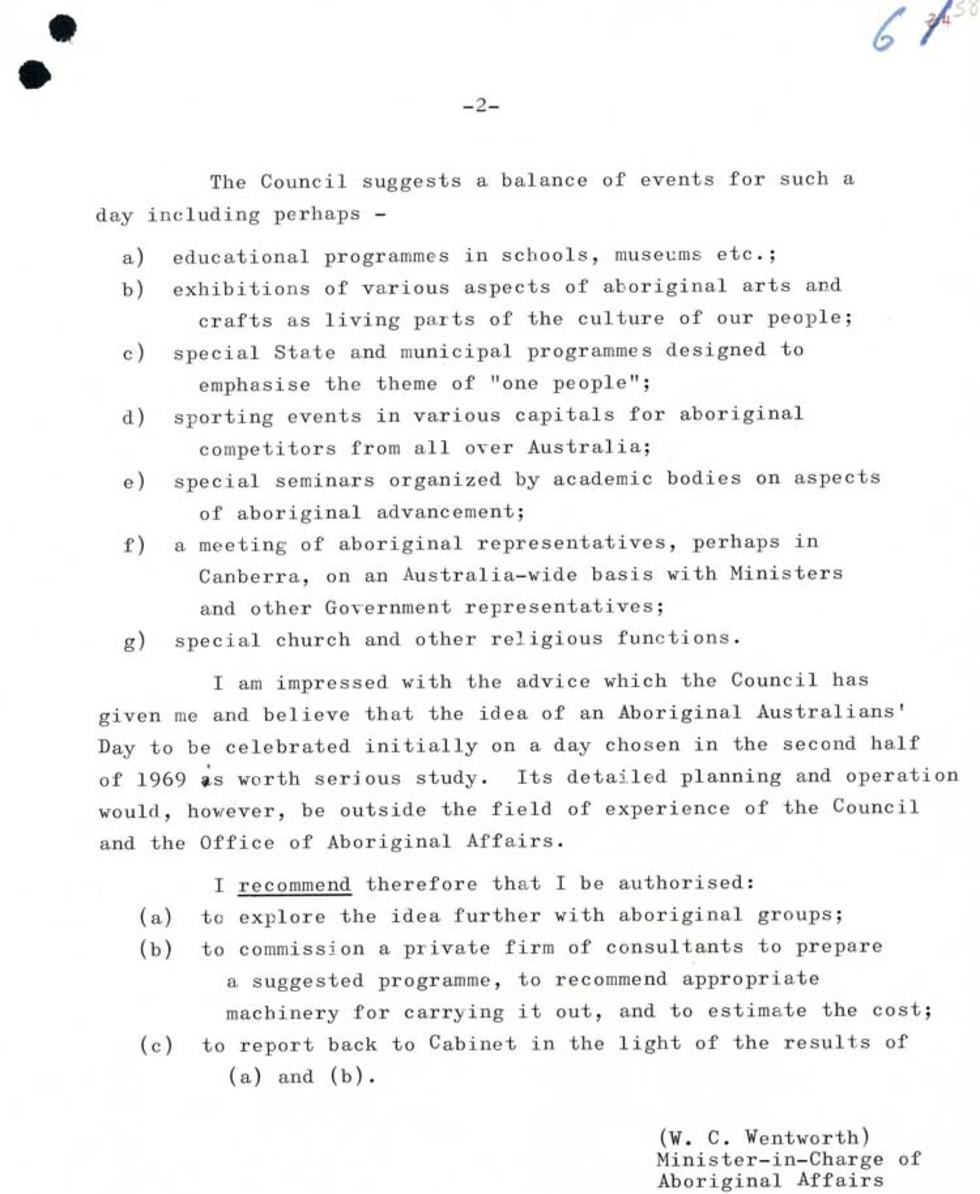
Draft Cabinet submission

Draft Cabinet submission
Aboriginal and Torres Strait Islander people should be aware that the National Archives' website and collection contain the names, images and voices of people who have died.
Some records include terms and views that are not appropriate today. They reflect the period in which they were created and are not the views of the National Archives.


Draft Cabinet submission

Draft Cabinet submission
[Page 1.]
[Underlined:] DRAFT
[Underlined:] CABINET SUBMISSION
[Underlined heading:] NATIONAL ABORIGINAL AUSTRALIANS' DAY
For a number of years the National Aboriginal Day Observance Council, a body constituted by a group of Missionary Societies, has conducted a National Aboriginals Day, usually on a Sunday in July. Originally the day was essentially one for special church services and similar observances organized by individual congregations. Gradually, however, the character of the day has changed and in some States it has become something of an aboriginal festival or celebration with varying degrees of emphasis from simple aboriginal festive gatherings to demonstrations of good will and mutual help between white and black Australians.
I have been brought to consider the future of this day: firstly because the Departments of Territories and Interior, which in the past have given some support to the organization of the day, now feel that it lies outside their field of responsibility; secondly because proposals for special action to increase the importance of the day both for aboriginal and other Australians have been advanced in a number of the informal consultations which I and the Council for Aboriginal Affairs have had with aboriginal groups and representatives.
The Council has advised me that they believe that if the Commonwealth Government were to throw its wholehearted support behind this day as an expression of both the status and dignity of the aboriginal people in their own right, and the essential identity of the different racial strains which make up the Australian people, there could be real benefit to the morale of the aboriginal people and to the attitude of other Australians towards them.
The valuable results which have flowed from the organized programmes of the Immigration Department in promoting the assimilation of "New Australians" illustrate what can, we hope, be achieved for "old" Australians.
/ -2-
[Page:] -2-
The Council suggests a balance of events for such a day including perhaps -
a) educational programmes in schools, museums etc.;
b) exhibitions of various aspects of aboriginal arts and crafts as living parts of the culture of our people;
c) special State and municipal programmes designed to emphasise the theme of "one people";
d) sporting events in various capitals for aboriginal competitors from all over Australia;
e) special seminars organized by academic bodies on aspects of aboriginal advancement;
f) a meeting of aboriginal representatives, perhaps in Canberra, on an Australia-wide basis with Ministers and other Government representatives;
g) special church and other religious functions.
I am impressed with the advice which the Council has given me and believe that the idea of an Aboriginal Australians' Day to be celebrated initially on a day chosen in the second half of 1969 is worth serious study. Its detailed planning and operation would, however, be outside the field of experience of the Council and the Office of Aboriginal Affairs.
I recommend [underlined] therefore that I be authorised:
a) to explore the idea further with aboriginal groups;
b) to commission a private firm of consultants to prepare a suggested programme, to recommend appropriate machinery for carrying it out, and to estimate the cost;
c) to report back to Cabinet in the light of the results of (a) and (b).
(W.C. Wentworth)
Minister-in-Charge of Aboriginal Affairs
Learn how to interpret primary sources, use our collection and more.
